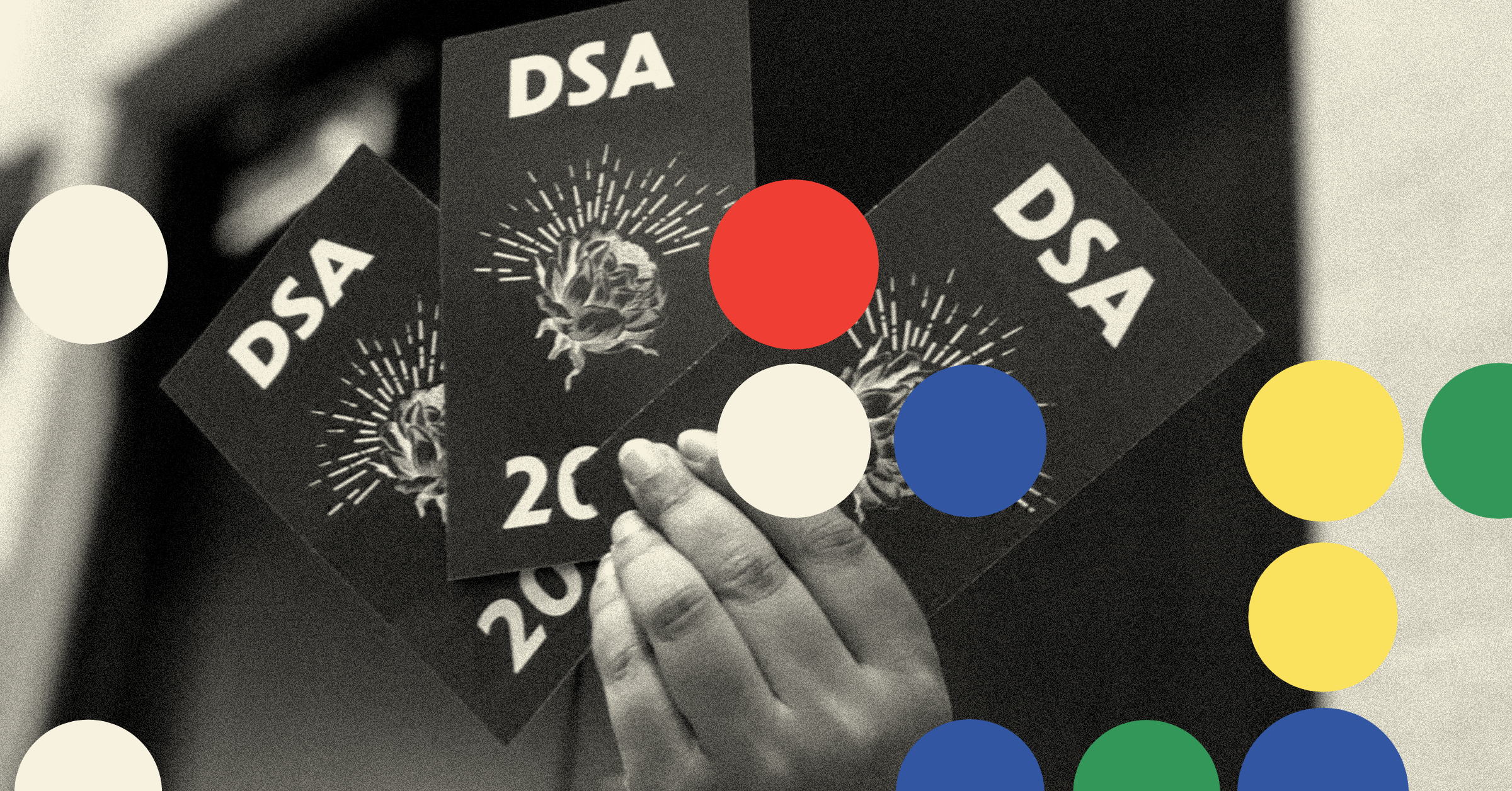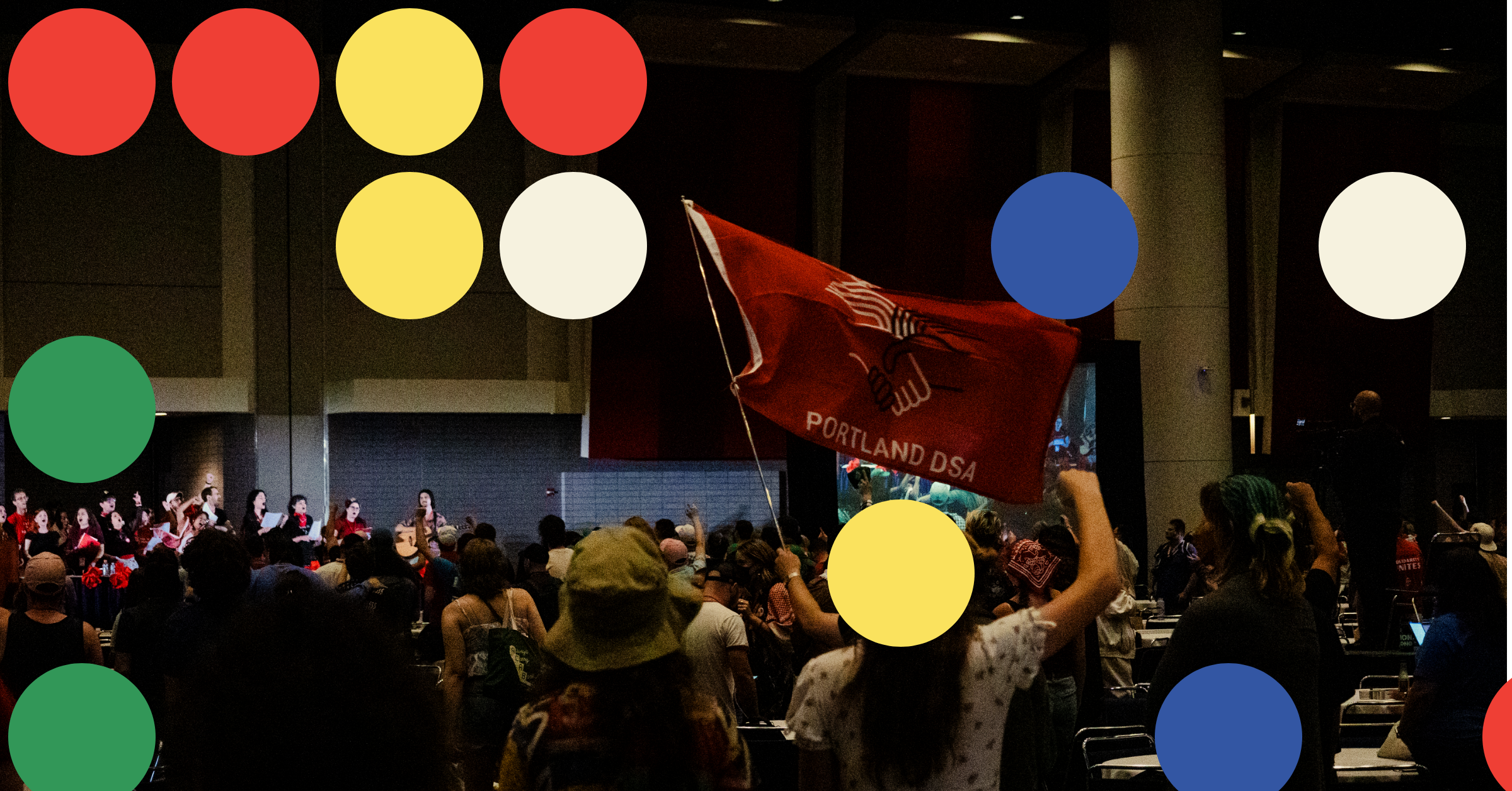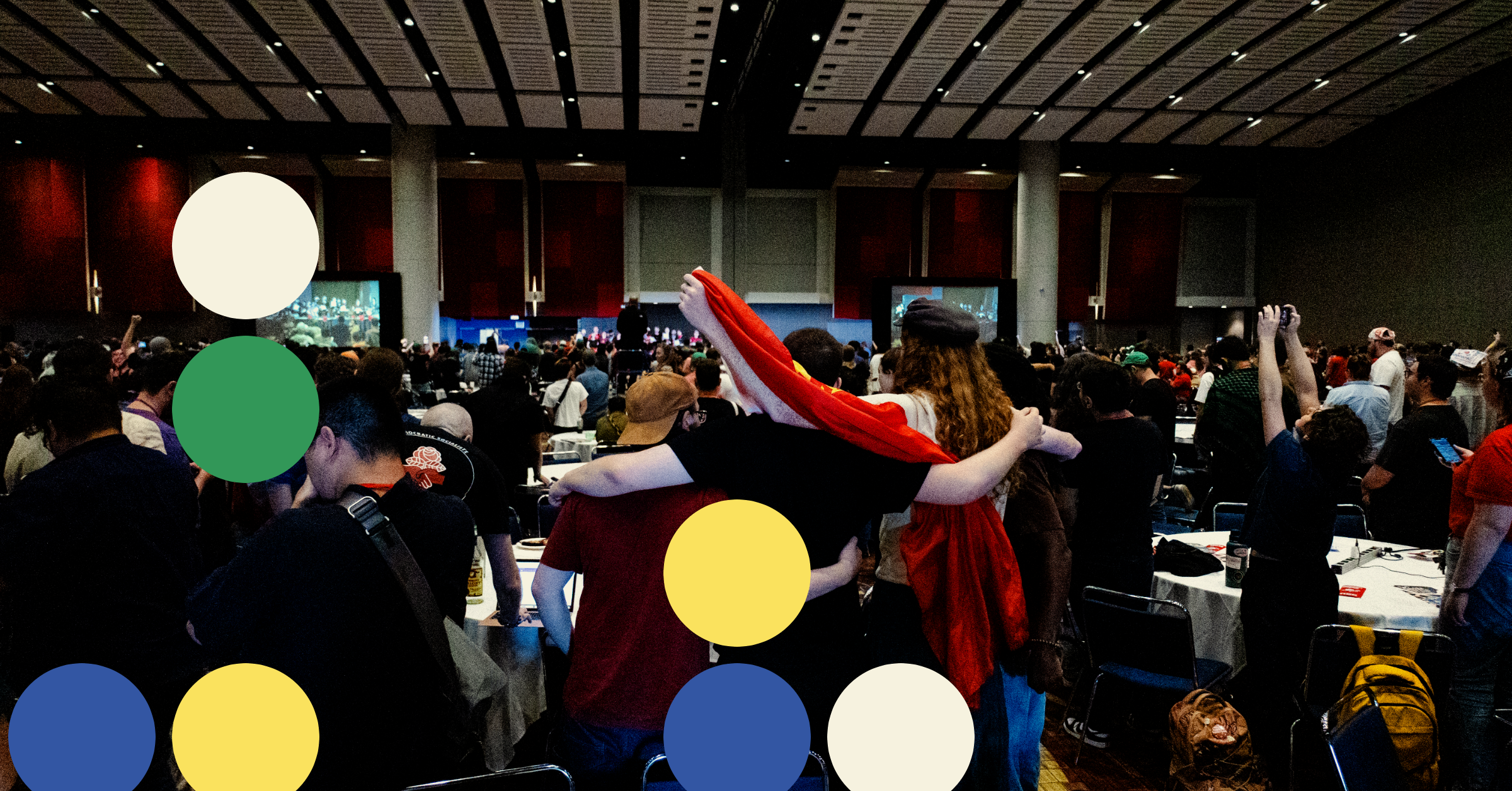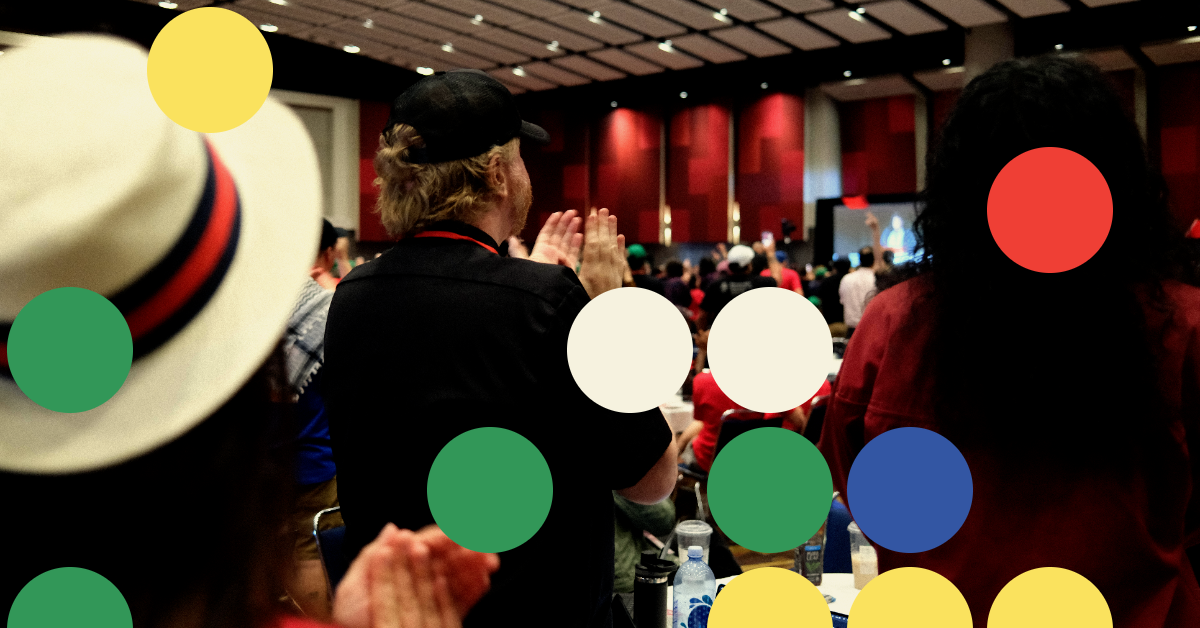It’s hard to express how demoralizing and anticlimactic it feels to hold a meaningful debate in person at a DSA meeting, to feel the room moving and shifting and a majority sentiment developing and excitement building towards a shared decision, only to be told at the culmination of the discussion, “okay, look out for an email from Opavote in the next 24 hours so you can vote.” You are instantly transformed from an active member of a collective finding its way together into an individual alone behind a screen. You may never know how, or if, your neighbor votes, or learn if you changed someone’s mind — and they may never learn if they changed yours.
Delegates to DSA’s 2025 Convention have the opportunity to decide if this type of digital democracy is the right path for our organization. The convention proposals, “R06: One Member, One Vote for Federal Endorsements” and “CB02: One Member, One Vote for National Leadership Elections” put forward by the Groundwork caucus, would bring email ballots to all DSA members for questions of federal electoral endorsements and for electing DSA’s National Political Committee, respectively.
While these proposed reforms seem like limited uses of digital democracy, they should be understood as part of Groundwork’s larger vision to shift DSA’s member decision-making from in-person to online, at both the chapter and national level. Since March 2024, my chapter, Metro Detroit, has been operating under a chapter-level 1M1V policy brought forward by members of Groundwork. All votes except for resolution amendments and votes at our yearly convention are sent to all chapter members via Opavote, an online voting tool.
This change has led to a significant degradation of the democratic life of our chapter. Online voting has been a net negative for the Metro Detroit chapter in three ways:
- First, 1M1V de-emphasizes collective decision-making and public debate, harming our ability to train members to operate as organizers and persuaders for socialism and a fully democratic society outside of DSA — which is one of the basic mandates of a socialist organization.
- Second, it has tilted the scales of democratic practice so that running a large-scale vote-whip operation conducted through private, one-on-one conversations is the only way to win or even be heard by most voters. This ensures that only the minority of members who join caucuses can expect to have a chance for their ideas and arguments, which is not a fair playing field.
- Lastly, 1M1V has emboldened our chapter leadership to put their thumb on the scales of decision-making in various ways and to stifle existing venues for members to share their arguments.
To halt this project across the organization, Convention delegates should vote against national 1M1V proposals, and when chapters are offered a 1M1V-style proposal to move all voting to online ballots outside of meetings, members should vote against implementing it.
A diminished democratic life
It’s right there in our name — the Democratic Socialists of America is fighting to democratize all of society. We want workers to believe that they can democratically run everything that matters in life, from the shopfloor to the economy to the state. To build this consciousness and the muscle to carry it out, DSA needs to be a place where workers and socialist militants can come together to analyze and strategize, to observe and participate in actual democracy, to become the leaders we need to democratize all spheres of our lives, and to learn to convince our friends, families, and coworkers that workers can and should run the world.
The beginning and end of most peoples’ experiences of democracy in the United States is casting a vote for something, whether a crappy political candidate, a ballot measure that will probably never be implemented, or a boss-friendly union leader. We all know this kind of participation is a sham. That’s why for generations, socialists have met to practice actual organizational democracy in the time-honored form of a meeting: a place where everyone has the same standing to bring an idea or argument forward, hear the same cases for and against that idea, and come to a collective resolution decided by the active members of the organization who are most likely to carry the idea out.
While we do still conduct debates at our hybrid Metro Detroit meetings, the number of online voters can be double or triple the number of meeting attendees — thanks to aggressive 1:1 vote-whipping texts and conversations that happen outside of the meeting. Organizing your supporters through 1:1s is a critical skill that socialists need, but in our chapter it is now the only skill that you need to win. Videos of meeting debates are inconsistently shared along with Opavote ballots, but only a handful of people have ever clicked on the video links. For example, fewer than 10 of the ~150 people who voted online to implement 1M1V watched the animated debate that happened at the meeting preceding the vote. About 50 people were at that meeting, meaning that the majority of voters made up their mind alone, without context, or through 1:1 conversations, never hearing the arguments people took time to prepare and make from the floor.
Simply put, 1M1V has made it feel like there are no stakes at our chapter meetings, like collective debate and discussion are a vestigial practice. In this way, 1M1V undermines our members’ ability to develop confidence in themselves as permanent persuaders of socialism who can move a room. We don’t practice democracy in DSA in order to get better at doing democracy in DSA: one of DSA’s most important tasks is training a mass layer of socialist organizers who can operate confidently in communities and struggles outside of the organization. DSA meetings should be a proving ground where we learn how each of us can best argue for our politics, with all the immediate feedback of cheers, groans, and voting cards shooting up (or failing to shoot up). When we lose, we practice to get better because if we can’t convince a room full of comrades to agree with us, how can we expect to win over our families, coworkers, and neighbors?
Proponents of 1M1V have said that one-on-one vote-whipping conversations are an adequate substitute for public discussion and debate, since paper members should be trusted to engage in discussion in response to being asked to vote a certain way. That’s true, but paper members who rarely or never come to events and meetings are less likely to have developed wide-ranging relationships across the organization or the opinions that come with them — in fact they may only know the person who is reaching out to whip their vote.
Is this paper member, who is by definition too busy or disengaged to attend meetings, expected to take the time to seek out opposing viewpoints in order to make an informed vote on something that will have little bearing on their life in the organization anyway? Is this a good way to make organizational decisions, with the majority of voters operating with partial information? Does this disengaged member learn anything about democracy, or learn to see themselves as a political actor and not just a “voter” — or does the experience reinforce for them that important decisions everywhere in their life are shaped somewhere out of view and then presented for a rubber stamp?
Minority rule
My Detroit comrade Aaron B. has written in the Groundwork caucus blog that for both 1M1V convention resolutions and 1M1V at the chapter level, “the principle is the same: enabling members to take part in important decisions through votes.” This sounds like a positive outcome, but 1M1V actually ensures that most members will only be able to take part in decision-making through voting and not through organizing for their own positions. If you are among the majority of chapter members who are not in a large caucus formation, you simply will not have the resources to run a vote-whipping operation that can beat the minority of people who are. This means only well-connected members can hope to shape the action and trajectory of the chapter.
There’s nothing sinister about having a whip operation. It’s a basic organizing skill and one that all DSA members should develop. But in an election with 150 or more voters, it takes a lot of organizing time and resources to craft your message, send mass texts, and schedule 1:1s to get your point out to enough people and convince the disconnected ones that they should dig up the Opavote ballot in their inbox and click on it. Members of caucuses tend to be hyper-participants in the organization, and have institutional knowledge about how to run a whip organization, along with the pooled connections across the chapter to reach enough voters.
Under 1M1V, this minority in the Metro Detroit chapter is realistically the only group who can win votes; in fact, since we started 1M1V there has not been a single meeting resolution brought forward by anyone who is not in a caucus (the majority of members).
GW has touted 1M1V as “democracy for busy people,” but it’s really only a very diminished and impoverished form of democracy that these busy people will encounter. One reason socialists love meetings is that, when run well, they can be a highly efficient and egalitarian format for busy people to make decisions about things they care about. Instead of waiting for someone to send them information about what is going on with a resolution and how to vote, busy people should be able to count on an invite to a regular, brief, accessible mass meeting where they show up to have a say, be heard, hear others, and feel a part of something larger than themselves. This puts “busy people” on the same footing as people who have lots of time for DSA.
Democratic backsliding
Since implementing 1M1V, politics and decision-making has moved from the public sphere, owned and monitored by everyone who shows up, to the private, where there is less transparency and accountability. Along with this move, there has been some backsliding on norms of democracy that our leaders should be protecting.
Mike Parker and Martha Gruelle outline some of these norms in Democracy Is Power, the union democracy bible: “Procedures should help to level the playing field” between majority and minority; no one should feel that leaders can use their resources or rule-making power to tilt the game. “The rules must be clear and simple” so that people don’t experience barriers to participation and everyone understands how things work. “Surprise and secrecy are enemies of democracy,” leading to mistrust that turns people off from becoming or remaining active members.
In our chapter, members have always argued for their positions on resolutions and political questions in our excellent chapter “newspaper,” the Detroit Socialist. Being able to make your case in writing is now one of the only avenues for a member without a huge whip-list to get their argument out to everyone in the chapter. And writing articles is an exercise in good faith and developing persuasive skills.
But over the last few months, our majority-Groundwork Steering Committee has locked the newspaper by surprise, implemented a rule that all articles must be reviewed for commentary by select members of the Steering Committee and not just by the publication’s editors (who are not members of any caucus), and argued for post-hoc rules to try to prevent publication of articles they disagree with. None of these developments technically prevent people from trying to publish positions that members of Groundwork may disagree with, but we all now understand it will be an unpleasant and confusing experience rather than something guided by reasonable and fair procedures. This is likely to have a chilling effect on members using our own publication for open discussion and debate — hardly the mark of a healthy democracy.
(We also have a chapter Slack, but political debate there is often met with pile-ons that last for days and other behavior that prevents it from being a home for productive, comradely discussions. Many members choose not to open it at all.)
Additionally, leaders have repeatedly sent out the Opavote ballots with editorialized titles and descriptions that show obvious bias for or against the resolution under consideration. In a fair digital democracy, resolutions should obviously be referred to simply by their titles as submitted and debated on; if member or leader commentary is to be included with the ballot it should be signed by its author and there should be a clear and fair process for anyone to submit this commentary.
This week, for example, a resolution titled “Resolution for Metro Detroit DSA to Endorse and Participate in the “Michigan for the Many” Coordinated Ballot Campaign” was sent out to members without that title visible, and only this text in the email to orient members to what is being voted on:
“Proposal for Detroit DSA to adopt Michigan for the Many” as a priority campaign, engaging the chapter in a DSA-led campaign to collect signatures and turnout for statewide ballot proposals to tax the rich to pay for public education, get corporate money out of politics and to adopt ranked choice voting in Michigan elections. This campaign will build organizing and campaign infrastructure to engage DSA members across the Detroit area, and the entire state, to organize our workplaces for these initiatives and to engage the broader public in conversations connecting these important measures to our socialist politics in furtherance of efforts to build a mass movement to defeat fascism, fight the oligarchy and reclaim our democracy while winning real, tangible changes for the working class across Michigan.”
This is a clear motivation in favor of the resolution, unsigned by whoever wrote it, and this text appears nowhere in the resolution we debated at the meeting. This does not signal to members that Opavotes themselves are fair or impartial procedures.
What members are missing
The job of a socialist organization is to build a machine that can convert liberals and the politically disengaged into socialist fighters who can transform their neighborhoods, workplaces, unions, and ultimately the state and all of society. I am a new member of a union that’s early in its reform process and still building the democratic structures needed to turn our members into active, militant fighters. Even though I’m new to the workplace, I feel confident that I can be a leader in organizing union meetings with my coworkers, setting fair rules for participation, training members to bring ideas and arguments to the group, and that I myself can move a room to my ideas when needed. I learned all of this from my years of organizing, chairing, and participating in democratic DSA chapter meetings.
All of our new members who’ve joined since November will not get to experience the transformation I did, from an atomized individual to a socialist militant, through being supported by comrades to develop a collective analysis and position on an important question, and to get up and make arguments on a fair playing field and learn from the experience. When all these new people are in a moment of struggle outside of DSA in the future, whether at a heated neighborhood or union meeting, or at a protest or strike trying to decide whether to back down or keep pushing, they will not have the training and confidence they need to know how to move the group, because there’s hardly a reason to develop these skills under 1M1V. This is DSA failing at a fundamental level to produce the organizers we need to transform the world.
If Groundwork is taken at their word that the experience of 1M1V in Detroit is one they would like to bring to all DSA members in all chapters, Convention delegates should send a clear message that real collective democracy and member development is a core value of our organization, and vote no on R06, CB02, and any resolution to bring 1M1V to their local chapter.




